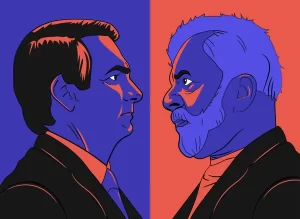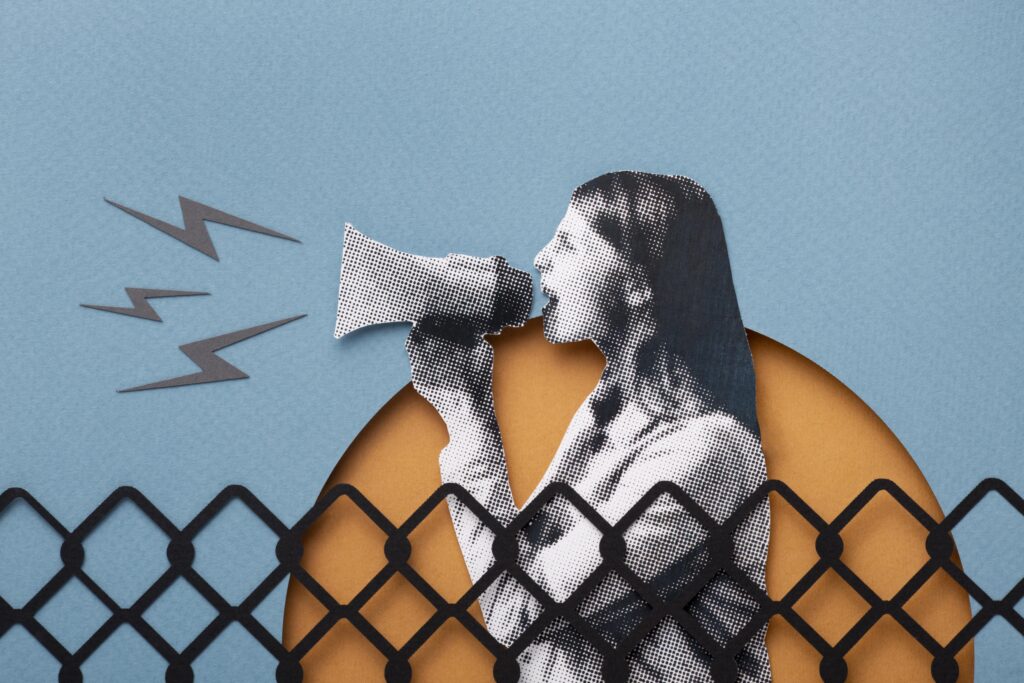PART II
Y: I’d like to focus on the conflict between freedom of speech and religions which you have previous works and studies before we move on to forms of extremism and Islamism particularly. There are also different perceptions towards this conflict as well as for these terms themselves. For example: “What is freedom of speech?” I’d like to ask whether there is a way to prevent this conflict given the different points of view in different countries.
HS: I think that freedom of expression and religion don’t have to be two opposite sides that clash and have to have this tension. There is no freedom of religion without freedom of expression. Because one part of religion is to express your views, your personal beliefs, and to express your religious values verbally or by rituals such as attending church, etc. Thus, freedom of religion and freedom of expression are the two sides of the same coin. They mutually strengthen each other. freedom of expression is a very valuable Principle for each and every religious group, whether for minorities or majorities. Because it’s a basic right to have beliefs in supernatural entities or whatever doctrines you adhere to. We should protect the freedom of religion and belief, also for the case where we don’t like the religion that we’re talking about.
That’s why I don’t think that there is an automatic contrast or tension between religion and freedom of expression. However, the tension arises when we have a religion that doesn’t accept criticism or basic freedoms or civil liberties for individuals which also entails the right to criticize, mock the religion, undermine and question religious dogma. That’s how it starts. We have this intolerant religion that doesn’t accept different forms of criticism, defamation, denigration, blasphemy, or whatever we call it. This is the case in today’s world. There is a tension between the right to think and communicate freely about religious issues versus the right to have one’s religion protected especially concerning the Muslim majority States.
Many states within the UN system want to establish a new right to protect their religion from criticism meaning that religion is entitled to protection and individuals. Attacking, mocking, or undermining one’s religious feelings should be punished. That’s why we see the use of blasphemy laws throughout the Muslim world where people are being fined, punished, tortured, jailed, or sometimes even receiving the death sentence for blasphemy. That’s a problem. This is something that goes beyond the Muslim majority world since we can also see this, for example, in Russia which has intensified its blasphemy legislation. India also practices pretty severe blasphemy legislation, which is sometimes directed against Muslims. We also have Christian Catholic majority countries in Africa and in Latin America that are also in favor of banning blasphemy. In short, there doesn’t have to be tension between religion and free speech. However, we have this issue that we observe frequently with some forms of authoritarian and anti-democratic religions in both national and international politics.
Y: I’d like to move to the hate speech debate because when we talk about freedom of speech, we also talk about hate speech. So how can we distinguish an act or an idea from a hate speech? By their targeted Community or individuals, the level of offensiveness, or the aim? What’s the level for it and how can we specify it?
HS: Most European countries have hate speech laws. That’s a direct consequence of the Nazi Germany and the Holocaust during WWII. There can be some pretty good historical reasons for having legislation against hateful speech. Because history has shown what happens when you demonize and dehumanize certain groups in society, it can ultimately end up with genocide. There are also hate speech bans in international human rights law. Incitement to discrimination, hostility, and violence is prohibited according to UN conventions. I think it’s very decisive and important to distinguish between hate speech and blasphemy. Because we are talking about two different legal categories.
Hate speech is supposed to protect people Against atrocities while blasphemy is supposed to protect gods, angels, religious symbols, religious books, etc. So those are two very different things. I think it’s very crucial to maintain that human rights should protect people but not our Political or religious ideas, values, convictions, or beliefs. That’s a very interesting and important distinction between the two. I also think that hate speech laws can be misused but that’s always completely dependent upon how courts in each and every country interpret these laws and how they practice them.
I have studied how non-democratic states in the UN system try to use human rights law in order to Promote religious censorship. For instance, instead of talking about blasphemy, you say that criticism of Islam is a manifestation of racism. Or if you criticize religion, it’s an act of hate speech which is already illegal. So what I consider dangerous is that countries having no respect for human rights and basic civil liberties are somehow using and instrumentalizing human rights language in order to promote authoritarian censorship norms. Human rights language, human rights principles, and law can be beneficial. It’s a precondition for democracy and freedom, but it can certainly be misused and instrumentalized for non-democratic reasons or purposes. That’s the struggle that I tried to describe in the UN system. If you go back 30 years ago you notice that many Muslim-majority countries were talking about how they want to protect the prophet, the God, the Quran and how they adhere to Sharia law. They were using a very religious language. For instance, the debate of Salman Rushdie and “the Satanic Verses” 25 years ago where you could see a very religious language where diplomats and state leaders were simply rejecting secular human rights. But if you look at today’s debate regarding the Charlie Hebdo, the Danish cartoon affair, etc. you don’t hear the religious language or the religious arguments anymore. Now it’s all about racism, hate speech, intolerance, Islamophobia, etc. These same countries with the same policies are utilising human rights language in order to promote censorship normsin short.
Y: Do you think we can consider hate speech as a theme, a red line for freedom of speech? Does such a line ever exist for freedom of speech and expression? Is there a red line?
HS: Yes, there is a red line. The freedom of speech is not absolute since no human is absolute. My freedom ends where when your freedom begins. There’s always a responsibility. You have your rights but always within certain limits to ensure that you don’t undermine the rights of others. That’s why the human rights law always consists of some rights as well as some limitations. It applies to freedom of expression as well. However, those limits are very different from country to country. In Europe, we have hate speech laws and some countries have laws against Holocaust denial, for instance. In France, supporting terrorism is a criminal offence as I am aware. However, the United States has much more liberal laws when it comes to blasphemy and hate speech. There is no blasphemy or hate speech in the US. the only thing that the US is criminalizing in this regard is a direct threat, an incitement to violence, which is also likely to cause imminent lawless action. Thus, the boundaries or the red lines are very different from country to country.
I do think that there might be some good historical reasons for the hate speech laws that are in place in Europe. As long as we have laws that only penalize very hateful language against communities, and they’re not interpreted by the courts in a very narrow sense and As long as then I don’t think there is a problem. However, all legislation can be misused.
Y: We talked about blasphemy a lot. I want to mention that here in France we have a right to blasphemy, which is a complete reverse scenario for many countries around the world. In many countries, religion interferes in the state and it leads the state institutions a lot. Do you regard the criminalization of blasphemy as a new method of censorship?
HS: I think blasphemy laws should be abandoned everywhere in Europe. The tendency has been for a long time with more and more countries abolishing their blasphemy laws, especially after Charlie Hebdo. Many countries abolished their blasphemy laws and they were never used anyway. They didn’t have any practical impact because you have to go many years back in time to find somebody being trialed for blasphemy. I think that has been an overall positive development in Europe that blasphemy laws are more or less they don’t have any practical impact anymore.
However, what happened in Denmark last year was very interesting. Denmark abolished its old blasphemy law in 2017 but reintroduced a new version of a blasphemy ban last year when some right-wing extremists burned the Quran in front of Muslim majority embassies., the Turkish and the Iraqi embassy to be specific. These demonstrations occurred in Copenhagen – Denmark and Stockholm – Sweden as well which caused mass riots, demonstrations, and violence in the Muslim majority world. Denmark has once before experienced the cartoon crisis where Danish embassies were burned down in Syria and Lebanon, and cartoonists had to go underground and live with bodyguards 24/7. Danish goods were boycotted.
It’s a massive fear that Denmark felt it had to do something so it doesn’t end up in the same situation one more time. Thus, it introduced a new law that bans improper treatment of religious texts, which is not a blasphemy law. It is much more narrow since it not about symbols but religious texts only. It bans the improper treatment of texts with a significant value for religious community. The first draft of the bill included religious symbols, which also meant the Christian crucifix and all the symbols. Then it was narrowed down to only being about religious text.
The bill aimed to have a legal instrument to prevent these Quran burners from causing all sorts of trouble both in the Muslim world but also in Denmark. What was interesting is that Denmark did adopt this new bill while Sweden didn’t. Sweden said that they didn’t need a new law as they already had legislation, the police, and the legal instruments we need in order to maintain public safety if someone threatens the public and the public safety. I think it was a clear example of how a small European state was afraid of a new crisis with the Muslim world. Denmark wanted to demonstrate that they were trying to solve this problem.
Y: Speaking of Charlie Hebdo, we all remember it here as a nation that exposed a grave security concern Which was Islamist and religious extremism. We can say that religious cartoons are always at the heart of the debate of freedom of expression. I want to highlight a different point on this topic which is the impact of foreign media organizations and how countries with Muslim-majority population. How these countries cover or reflect these stories in a way that it increased the tensions? For example, the impact of Turkish media on how covered the religious cartoons in a way as if France and its government published them which was not case here.
HS: Exactly. That’s the problem. Though I’m not an expert on how these cartoons and all these blasphemy cases are being covered in the Muslim majority world, it’s a recurrent problem that the people are unable to distinguish between the state and the private media institutions publishing whatever they want in a free society. At least when it comes to religion and cartoons. If we go back to the Danish cartoon affair in 2000s, there were some Muslim ambassadors in Denmark that wanted a meeting with the Danish Prime Minister back then. The Prime Minister simply rejected this meeting because he rejected the premise of it since there is freedom of the press and this press organ is a private newspaper. It means that the Minister wouldn’t have the need to discuss it on this matter.
It’s the same thing with the Quran burnings and the legislation in Denmark. You have these protesters burning the Quran and these bodyguards that are protecting them Because there are some credible death threats out there. The perception regarding these images in Muslim majority world is is that these protesters which there are very few, are supported by the state that the state of Denmark. It’s a problem of perception as well as the effect of social media, fake news, and disinformation, and how these events are being spread around the world and how they are being perceived in the Muslim majority world which is a real Problem.
That’s probably a normal state of mind when you live in a country where the media is controlled by the state. So, it might maybe hard for some people to understand that there can actually be free and independent media institutions that run contrary to state interest.
But it it doesn’t mean that the politicians or the Prime Minister approves what they’re doing. right, but this is, but this is not an argument that flies in many parts of the world where there is no democracy. So, I kind of understand the hardship and the Choices politicians face When it comes to these matters.
Y: Following these Quran-burning protests, the UN Human Rights Council adopted a resolution that condemned the burnings and declared them hateful acts. Some countries, like the US, the EU, and other Western majority countries oppose it over concerns. About its interpretation of restrictions on freedom of expression in the future. So does it mean that compromising on human rights is inevitable in international organizations like the UN, considering your previous works and studies on the UN system so and that it can be a habitat for like-minded countries of a shared culture or a religion to form a kind of coalition and lobby on matters of their own interests and work together in these international organizations. What do you think about it?
HS: Muslim countries in the UN have long tried to push forward and get the UN to adopt new international legal instruments that prohibit blasphemy, often referred to as the defamation of religions. They also succeeded in establishing an International Day to Combat Islamophobia in the UN system back in 2022, about two years ago. The French UN ambassador opposed this, questioning the need for an Islamophobia day when there are no equivalent days for Christianophobia, Judaeophobia, or Hinduphobia. He argued that the UN already has an International Day against religious persecution, which should be sufficient to commemorate religious intolerance and persecution and to highlight the importance of religious freedom, including the right to convert, reject religion, or be an atheist or agnostic.
In the case you mentioned regarding the Quran burnings, it was a victory for the Muslim-majority world to have the UN condemn these actions. This situation differs from the cartoon controversies, such as the Danish cartoon crisis, where many European countries and the US defended religious cartoons as an integral part of European culture and the legacy of the Enlightenment and secular liberal democracy. However, it’s much harder to defend and justify burning books, which is associated with the destruction of culture, notably by Nazi Germany, where book burnings were symbolic acts against Communist, Jewish, and left-wing literature.
This time, the situation is different. While cartoons can be defended as a necessary part of democracy, very few people sympathize with right-wing activists burning books in front of embassies. Therefore, it’s much harder for Europe and democracies to protect that right. Personally, I find these actions unsympathetic. The individual most famous for burning Qurans in Denmark and Sweden is associated with a right-wing extremist political party, which I don’t consider democratic.
I also think it can be dangerous when organizations like the United Nations promote new censorship norms. This is particularly alarming for Western democracies and international organizations.
The UN’s ongoing debate on free speech and religion is concerning because there appears to be a majority in favor of adopting new international legislation that could restrict the right to freely think and communicate about religion. The case with the book burners is a perfect example of how such situations can be used to undermine free speech. Almost everyone finds book burning repulsive, unsympathetic, and provocative, which makes it easier to justify limiting expression in these contexts.
Y: Thank you very much once again for sharing your insights with us through our journal CSACTU. It was a very pleasant and a rich conversation. The CSACTU team appreciates your time and commitment for us and we wish you a good continuation.
HS: I would like to thank you as well for reaching out to me and for showing your interest.










